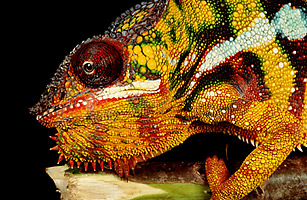
Panther chameleon.
(3 of 3)
Well-run ecotourism can provide support for conservation, but even the best parks might be hard pressed to compete with the potential revenues from logging, poaching or mining. The strategy of avoided deforestation, however, offers much more. Rain forests like those in Madagascar contain billions and billions of tons of carbon; destroying the trees and releasing the carbon not only kills local species but also speeds global warming. Proposals in the global climate negotiations would allow countries to offset some of their greenhouse-gas emissions by paying rain-forest nations to preserve their trees. It's win-win, with both the climate and the critters getting a boost. In eastern Madagascar, CI and WCS are working together to protect about 865,000 acres in the Makira Forest with a range of carbon investors that include Mitsubishi and Pearl Jam. Closer to Andasibe, CI and its partners are hiring villagers to plant trees on eroded land, which creates corridors to connect fragmented habitats, may earn carbon revenues and provides needed employment. "We're bringing back the shelter of the forests, and we don't have to cut trees," says Herve Tahirimalala, a Malagasy who is paid $100 a month to work on the project.
The corridors created by CI's Andasibe tree-planting program show how a small tweak can reduce the species-killing effects of climate change — but also how longer-term fixes are needed. Fragmented habitats are problematic because many endangered species wind up trapped in green oases surrounded by degraded land. As global warming changes the climate, species will try to migrate, often right into the path of development and extinction. What good is a nature reserve — fought for, paid for and protected — if global warming renders it unlivable? "Climate change could undermine the conservation work of whole generations," says Larry Schweiger, president of the National Wildlife Federation. "It turns out you can't save species without saving the sky."
That will mean reducing carbon emissions as fast as possible. In the U.S., the CBD has made an art out of using the Endangered Species Act, which mandates that the government prevent the extinction of listed species, to force Washington to act on global warming. The CBD's Siegel led a successful campaign to get the Bush Administration to list the polar bear as threatened by climate change, and she expects more species to follow. "Polar bears are the canaries in the coal mine," says Siegel.
Why We Can't Wait
What's especially frightening is
how vulnerable even the best conservation work can be to rapid changes — both climatic and governmental. Over the past couple of months, Madagascar has fallen into a political abyss, with Andry Rajoelina — the former mayor of Antananarivo, the capital — forcing former President Ravalomanana from office on the heels of deadly protests. As a result, development aid to the desperately poor country has been halted, and conservation work has been disrupted. Reports have filtered back of armed gangs stepping into the vacuum to illegally log the nation's few remaining forests. "They're ripping out valuable timber as quickly as they can," says Mittermeier.
News like that can tempt even the staunchest defenders of wildlife to simply surrender. And why shouldn't they? In a world where hundreds of millions of human beings still go hungry and the global recession has left all but the wealthiest fearing for their future, it's easy to wonder why we should be concerned about the dwindling of the planet's biodiversity.
The answer is that we can't afford not to. The same natural qualities that sustain wildlife — clean water, untainted land, unbroken forests — ultimately sustain us as well, whether we live in a green jungle or a concrete one. But there is an innate value to untrammeled biodiversity too — one that goes beyond our own survival. When that is lost, we are irretrievably diminished. "We live on a very special planet — the only planet that we know has life," says Mittermeier. "For me, conservation is ultimately a moral obligation and simply the right thing to do." That leaves us a choice. We can save life on this special planet, or be its unwitting executioner.